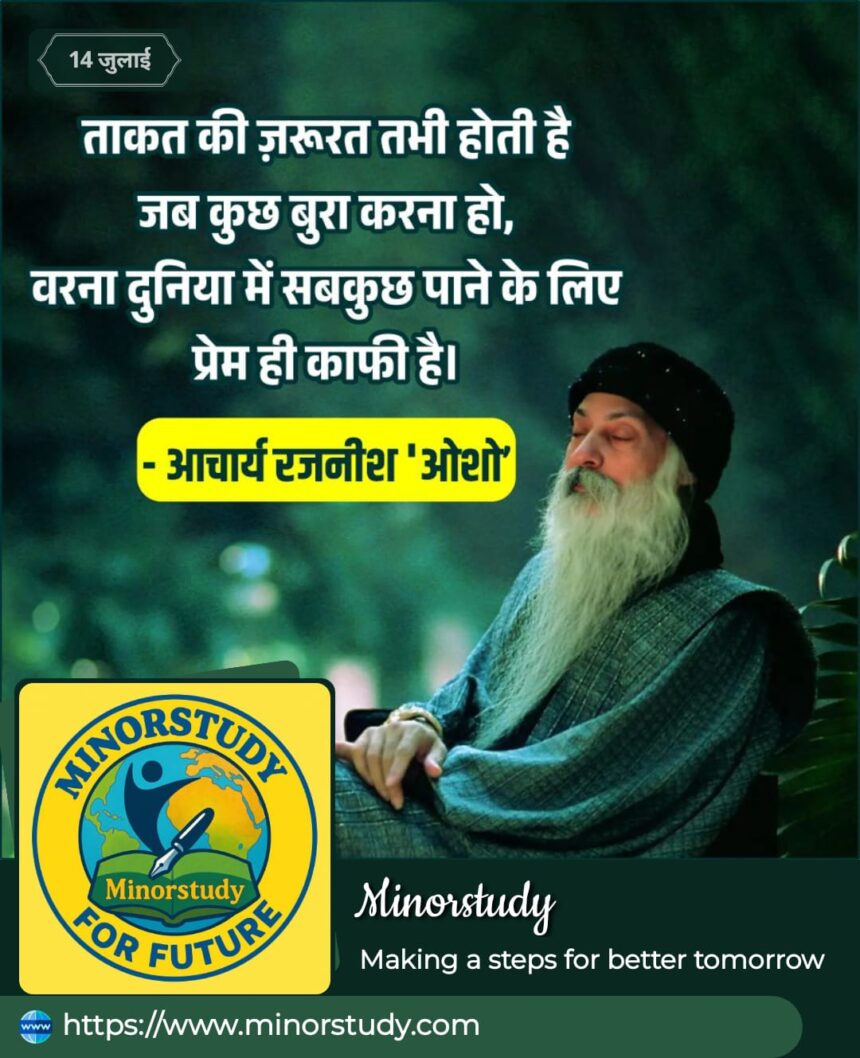🧘 All About Acharya Rajneesh ‘Osho’: His Life, Legacy, Controversies & Daily Impact
“Love is needed only when something bad has to be done, otherwise love is enough to achieve everything in the world.”
– Acharya Rajneesh ‘Osho’
- 🧠 Who Was Osho? | A Brief Overview
- 📖 History & Early Life of Osho
- 🪔 Osho’s Philosophy: The Inner Revolution
- 📅 Timeline of Osho’s Life and Major Events
- 🧾 Surprising and Powerful Facts About Osho
- 💫 Significance of Osho in Today’s World
- 🌿 Osho’s Teachings in Daily Life
- 🤔 Frequently Asked Questions (FAQs)
- Q1: Why was Osho controversial?
- Q2: What is Dynamic Meditation?
- Q3: Was Osho a religious guru?
- Q4: What is “Zorba the Buddha”?
- Q5: How is Osho relevant today?
- 🌟 Wishing You Osho’s Light
- 📌 Important Points to Remember
- 🧭 Conclusion: Osho’s Power in Our Lives and Society
- 🙌 Final Words
A rebel mystic. A provocative thinker. A spiritual scientist. These are just a few ways to describe Acharya Rajneesh, more famously known as Osho. Loved by millions, criticized by many, and understood deeply only by a few — Osho was one of the most dynamic and influential spiritual leaders of the 20th century.
In this human-centric article, we’ll take you on a powerful journey through Osho’s history, facts, philosophy, timeline, FAQs, significance, and the daily impact of his teachings. You’ll see why even decades after his death, Osho continues to challenge conventional thinking and shake the very foundation of blind belief.
🧠 Who Was Osho? | A Brief Overview
Full Name: Chandra Mohan Jain
Popularly Known As: Acharya Rajneesh → Later, Osho
Born: December 11, 1931, Kuchwada, Madhya Pradesh, India
Died: January 19, 1990, Pune, Maharashtra, India
Occupations: Philosopher, Mystic, Spiritual Teacher, Public Speaker, Author
Movements: Rajneesh Movement, Neo-Sannyas International, Dynamic Meditation
📖 History & Early Life of Osho
Osho was born into a Jain family. From a young age, he was intellectually curious, fiercely independent, and spiritual without being religious. He often questioned rituals, superstitions, and societal norms. By the age of 21, he had a deep mystical experience that transformed his consciousness.
📘 Key Educational Milestones:
Studied philosophy at Jabalpur University
Worked as a professor of philosophy
Gave public talks that began attracting intellectuals and seekers
By the late 1960s, Osho began initiating disciples into Neo-Sannyas, not as renunciation of life but as deep acceptance of it—with awareness.
🪔 Osho’s Philosophy: The Inner Revolution
Osho’s teachings spanned thousands of discourses and touched upon love, meditation, death, sex, politics, psychology, enlightenment, and everything in between.
Core Messages of Osho:
Live totally, die consciously.
Celebrate life—don’t escape it.
Meditation is not effort, it’s awareness.
Love is your nature, not something to seek.
Truth cannot be borrowed; it must be realized.
Religions divide—consciousness unites.
🧘 He was the first master to say “Sex is sacred” and should be transcended through awareness, not suppressed in guilt.
📅 Timeline of Osho’s Life and Major Events
| Year | Event |
|---|---|
| 1931 | Born in Kuchwada, Madhya Pradesh |
| 1957 | Completed MA in Philosophy, topper in India |
| 1960s | Began lecturing across India on spiritual revolution |
| 1970 | Introduced Dynamic Meditation and began Neo-Sannyas movement |
| 1974 | Established Osho Ashram in Pune |
| 1981 | Moved to the USA; established Rajneeshpuram in Oregon |
| 1985 | Faced legal troubles, arrested and deported from the US |
| 1986 | Returned to India; Pune ashram revived |
| 1990 | Died in Pune, leaving behind a rich spiritual legacy |
🧾 Surprising and Powerful Facts About Osho
🔥 Authored over 600 books, translated into 60+ languages
🧠 IQ believed to be over 180, among the top intellectuals of the time
🚘 Owned 93 Rolls-Royces, drawing global media controversy
📚 Osho spoke on Jesus, Buddha, Krishna, Mahavira, Gurdjieff, and Marx with equal insight
🎧 His discourses are still among the most listened to in the spiritual world
🕉️ Coined the term Zorba the Buddha—a union of sensuality and spirituality
🧍 His meditations combine movement, catharsis, silence, and celebration
📽️ Multiple documentaries and films have been made on his life (e.g., Wild Wild Country)
✈️ He was deported from 21 countries, yet his followers increased globally
💫 Significance of Osho in Today’s World
🌍 Social Significance:
Questioned dogma and awakened critical thinking
Encouraged self-inquiry and breaking mental conditioning
Advocated for conscious communities over organized religion
🧘 Personal Significance:
Revolutionized the practice of meditation for the modern mind
Created practical spiritual tools for inner peace
Gave people courage to live authentically, love fearlessly, and die consciously
🌿 Osho’s Teachings in Daily Life
1. Relationships:
He taught that love must come from fullness, not from need. When both partners are whole within, love becomes divine.
2. Work & Ambition:
He didn’t preach renunciation—he asked you to work mindfully, live joyfully.
3. Health & Healing:
Meditation, laughter, dance, and celebration were his “medicine” for the soul.
4. Parenting:
Osho believed that children must be raised in freedom, not fear. “Don’t teach children what to think, teach them how to think.”
🤔 Frequently Asked Questions (FAQs)
Q1: Why was Osho controversial?
A: His open talks on sex, rejection of traditional religions, and luxurious lifestyle (Rolls-Royces) created controversy. But his followers saw him as a liberator from hypocrisy.
Q2: What is Dynamic Meditation?
A: A 5-stage meditative technique created by Osho that involves breathing, catharsis, jumping, silence, and celebration.
Q3: Was Osho a religious guru?
A: No, he rejected all labels. He called himself an “existential mystic” who celebrated life, not rituals.
Q4: What is “Zorba the Buddha”?
A: Osho’s ideal human—a person who combines the earthiness of Zorba (joy, body, music) with the silence of Buddha (meditation, awareness).
Q5: How is Osho relevant today?
A: More than ever. In a world plagued by stress, division, and artificial living, Osho’s emphasis on authentic living, inner awareness, and joyful rebellion is vital.
🌟 Wishing You Osho’s Light
🕉️ “May the silence of Osho echo in your heart. May your love be rooted in awareness. May you have the courage to be truly free.”
🧘 “Celebrate life. Don’t condemn it. Live your truth unapologetically.”
📌 Important Points to Remember
Osho was not against religion but against unconsciousness.
His meditations are designed for modern minds, full of distractions.
Freedom, love, laughter, and death—he tackled the most taboo topics openly.
His legacy is not in temples, but in the transformation of consciousness.
The real tribute to Osho is not worship, but living his vision with awareness.
🧭 Conclusion: Osho’s Power in Our Lives and Society
Osho lived as a storm—he questioned, he laughed, he rebelled, and he loved. He didn’t want followers—he wanted free individuals. In a world full of borrowed beliefs and second-hand truths, Osho remains a blazing reminder that truth cannot be taught—it must be experienced.
He did not leave behind a religion. He left behind a revolution of consciousness.
Today, when we are overwhelmed by anxiety, caught in societal roles, or lost in shallow living, Osho’s voice still whispers through the chaos:
“Be a light unto yourself. Celebrate everything. Love deeply. Meditate often. Live dangerously.”
🙌 Final Words
Whether you agree with him or not, Osho will make you think—and that alone makes him one of the greatest spiritual provocateurs in history. And perhaps, that is exactly what the world needs today—not comfort, but awakening.
💬 “Truth is not something outside to be discovered, it is something inside to be realized.” — Osho









Good day I am so thrilled I found your blog, I really found you by error, while I was searching on Aol for something else, Nonetheless I am here now and would just like to say thanks for a remarkable post and a all round entertaining blog (I also love the theme/design), I don’t have time to browse it all at the moment but I have saved it and also added in your RSS feeds, so when I have time I will be back to read a great deal more, Please do keep up the fantastic job.